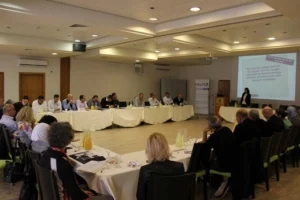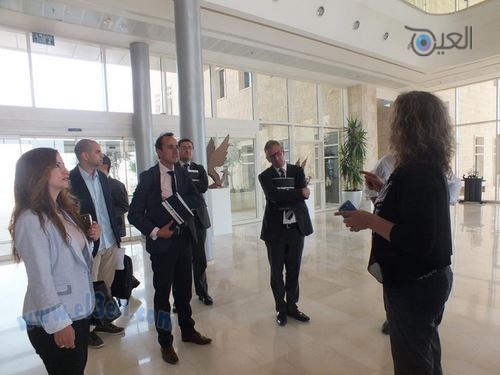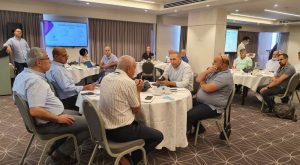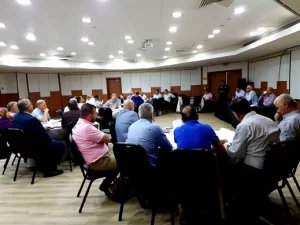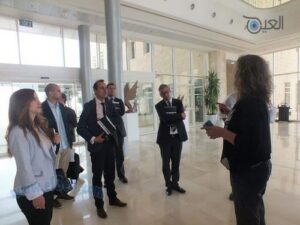Injaz Center – the professional development force engine of the Arab local authorities, met with Australian Ambassador Dave Sharma, Danish Ambassador Jesper Farr, Spanish Deputy Ambassador Miguel Moro and Japanese Deputy Ambassador Toshio Yamamoto, as part of a tour organized by the Injaz Center in Nazareth. The aim of this meeting was to inform each of the different embassies of the situation of the Arab minority in the country, specifically the political and economic situation. The session was attended by Mr. Shawky Khatib, Chairman of Injaz Center, Ms. Ghaida Rinawi Zoabi, Director General of Injaz Center, and Mr. Avrom Burg, author, former Knesset Member and Adviser at Injaz Center.
The session was opened by Ms. Ghaida Rinawi Zoabi, welcoming the distinguished attendees, speaking about Injaz Center and the objectives of its establishment, touching upon the political and economic situation of Arab citizens in the country: “Injaz Center was established in 2008 with the aim of developing an Arab local government with the elements of sound professional management, consisting of high-quality local councils and municipalities, capable of working collectively for good local governance, an Arab local authority with qualified elected and administrative human cadres and following the rules of sound management, initiates, leads and implements economic and social development paths. And to create mutual trust between the authority and the public, which contributes to the development of a sense of belonging and the conviction that the authority serves the interests of the public. She added: “Arab citizens in the country see the local authority as a development lever that will improve the condition of Arab society, especially in light of the racist policies pursued by the state towards them. Whereas the percentage of voting for the Knesset among Arab citizens is approximately 50%, unlike this year, which reached 73% due to the unification of the Arab Knesset members in one joint list. While the percentage of Arab citizens voting for Arab local authorities reaches 80%. This confirms that Arab citizens affiliate more to local authorities than to the Knesset or state institutions. Accordingly, Arab citizens hold greater expectations from the local authority. In addition to the fact that local authorities also suffer from systematic racist policies in the form of obtaining budgets, economic development and expansion of areas of influence”. Mr. Shawki Khatib, chairman of Injaz, also spoke about the historical situation of the region since the establishment of the state, the solutions of the Nakba, the first and second Intifadas, the martyrdom of 13 Arab youth, and a significant escalation in the state’s approach towards Arab citizens in the country, which was represented by policies of tightening the noose in all areas of life . This was reflected in the government’s policy in the recent elections and the racist calls made by the Netanyahu government towards Arab citizens, he said. “The real conflict in this region is the struggle to preserve the land,” he added.
